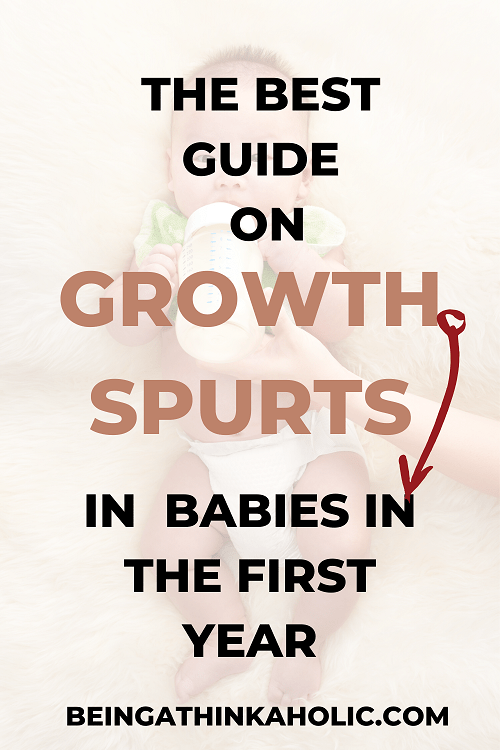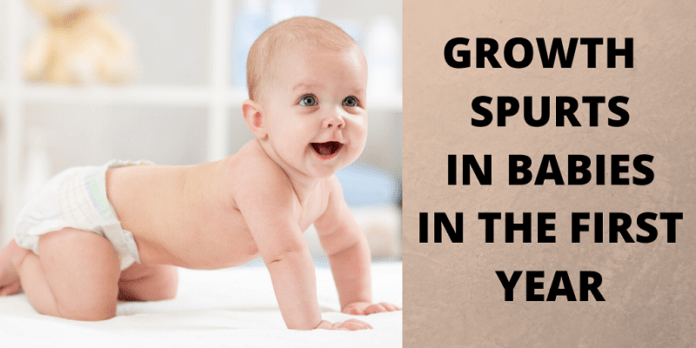All mothers remember that first day when they held their little bundle of joy. And all moms would agree that they all grow up so fast. Time flies with babies!! Babies grow over a period of time but there are some growth spurts that most babies go through.
First year growth spurts are days when the baby changes his pattern of daily activities. The growth spurts in babies are also known as frequency days and are very eminent during the first 12 months of the baby. It is usually the period during which the baby is hungrier than usual and the need for breastfeeding your baby is very frequent. Apart from the growth spurt feeding, your baby will suddenly exhibit some type of fussiness in their behavior.
After the arrival of your newborn, there is a particular pattern or routine related to her/his feeding and sleeping which you must be following; then suddenly you will notice certain changes in the feeding requirements. Your baby will be hungrier than usual and will even be willing to sleep for longer hours. This happens because of the growth spurt in babies.

Table of Contents
Growth Spurts Vs Food Spurts
During the period of a growth spurt, usually, your baby will grow around 3 times of her/his birth size. The height, weight and head circumference of your baby will increase during growth spurts. However, growth spurts are somewhat different from food spurts when it comes to the growth of the baby during that period.
Both during a growth spurt and food spurt; there is an increase in the food intake of the baby but during food spurt, there is no such rapid growth in the baby’s body as compared to that occurring during the growth spurt.
Signs of Growth Spurt in Babies
The following are the most common signs of a growth spurt in babies:

Baby Hungrier Than Usual
With growth spurts, your baby will seem to be much hungrier than usual times. In case your baby is being breastfed, you will notice that there will be longer breastfeeding sessions and the time gap between the breastfeeding sessions tends to reduce.
This clearly indicates that your baby is going through a period of growth spurts. If your baby is not on breastmilk and is formula fed; then due to growth spurts, she/he will feel hungry even after feeding sessions.
Breastfeed is always preferred over formula feeding. But the latter is not bad either. You should read the post, Misconceptions About Formula Feeding to clear some doubts about it.
During growth spurt in babies, most nursing mothers think there is less lactation in their body but actually, it is the growth spurts that are responsible for this. Growth spurt feeding is not an indication of less milk supply.

Changes in Sleep Pattern
Usually, most of the growth in babies occurs while sleeping and during growth spurts, your baby will need more sleep. While your baby is sleeping, the brain of the baby will signal the pituitary gland to secrete the Human Growth Hormone which facilitates the process of growth in the baby’s body.
Some babies sleep for long hours altogether while some take short naps throughout the day. Also, most of the babies during the period of growth spurts wake up numerous times during the night.
(There are some mistakes we make as parents when it comes to the baby schedules. Read Our Post, Baby Sleep Mistakes You Could Mend to know more)
Increased Crankiness
A growth spurt in babies comes with behavioral changes most of the time. Increased fussiness and crankiness in your baby are the most common ones, that you will be able to notice during this phase.
She/he will be somewhat irritable or clingy and would cry very often. This might be because of the increased hunger and growth that the baby feels tired and is unable to bear it.
How to handle growth spurts in babies for new parents is a tricky situation. Holding the baby and cuddling them during this time makes them feel better. They are too small to express and the only thing that comforts them the most is the mother and her touch.
Learning New Tricks due to Growth Spurts
Baby growth spurts come with development leaps. Your baby will learn some new skills or activities during this time. These new activities could be crawling, rolling over, smiling, clapping or grasping things etc. But however, these activities may come during growth spurts or even may come naturally during a time period.

When do growth spurts occur and how long does it last?
Usually, growth spurt in babies occurs at a particular time of growth. Thus, sometimes knowing the tentative times help in being prepared. It must be noted that each child is different and grow at a different pace.
The same is case, with milestones as well and parents tend to get stressed. Parents should read the post, Why Should You Not Worry About Baby Milestones in the First Year.
A growth spurt in babies approximately happens at the following times:
- During the first year, the occurrence of growth spurts is very common and rapid as well. Initially, they occur at around 7-10 days after birth.
- Then the growth spurts occur at 2-3 weeks, 4-6 weeks, 3 months, 4 months, 6 months and 9 months.
Even after the first year, growth spurts keep on occurring in toddlers within some monthly intervals and it further leads to teenage growth spurts
In most babies, growth spurts last for a few days i.e. like 2-3 days. However, when the age increases; the duration of growth spurts also tends to increase and can last up to a week sometimes.
How to handle growth spurts in babies?
Handling first year growth spurts is not easy as it disrupts the schedule and is a tough phase for the mother due to growth spurt feeding. When it comes to how to handle growth spurts in babies, the following tips can help:
- Breastfeeding moms should take care of their health and nutrition properly as your baby will get the required nutrients from them only. You should eat and drink properly at regular intervals so that your body does not get exhausted easily due to long and frequent nursing sessions in the time of growth spurt in babies.
- You should also drink plenty of water to keep your body hydrated as all the liquid contents from your body would be drained by your baby as the baby is hungrier than usual
- You can try and arrange for external help in household chores and for baby care also. It can in the form of appointing someone to assist you with these activities or someone from your family can help in doing that. The main aim is that if there is someone to share the load, it becomes less exhausting for a mother
- Sometimes, you might feel that there is enough lactation happening in your body and you might get worried about it. But as your baby increases her/his intake; the production of milk in your body will also increase. So, it is always advisable not to provide supplement formula milk to your baby at least till 6 months of age.
- During the growth spurt, your baby will crave for more closeness with you. So, you can opt to carry your baby in a sling if the back feels strained to carry the baby for long hours. It always helps that there is someone else to carry the baby with whom the baby feels comfortable. In our case, Little Miss A always felt better when her father carries her so it was a major relief for me.
You may like to read our post, My Daughter Has a Penguin Dad

How to feed your baby with growth spurts?
During a growth spurt, the baby will not only be cranky but will also be feeding more frequently. The baby can breastfeed as often as one hour and also for a longer duration of time. Most mothers feel that their supply is going down at the time of growth spurt in babies and they will not be able to match the demand.
However, take a cue from the baby and feed them as often as they demand. The baby will be hungrier than usual and thus, the demand will increase the supply. Remember, this is a phase and will last a few days, after which the baby will go back to a normal routine.
Frequent feeds can be exhausting for the mother and thus, you should stay hydrated and rest as and when possible.
In cases of growth spurts in formula fed babies, you can increase the number of feeds for your baby. But this increase in feeds can be done gradually and not too fast and should be practiced for a few days i.e. during the growth spurt period only.
If Growth Spurts Persist for a Long Time
Sometimes, there may be situations in which you notice the symptoms are the same as that of growth spurts but they prevail for a longer period of time. In such a scenario, you should see a pediatrician immediately as there might be some other health issues that make the baby cranky.
Growth spurts can be exhaustive for both the mother and the baby; but it is only a matter of a couple of days and the time will pass quickly. With proper care and some support, you can definitely overcome this period easily and swiftly and enjoy seeing your baby grow and do new things.





[…] in the first year of parenting, there is another important G i.e. growth spurts. Read our post, Growth Spurts in Babies in the First Year to know […]
[…] (You may like to read our post, Growth Spurts in the First Year) […]
[…] Growth Spurts in Babies […]